Introduction of SEO
The digital marketing landscape is in a constant state of flux, with search engine optimization (SEO) at its core. What was once a realm dominated by keyword stuffing and basic link building has evolved into a sophisticated discipline focused on user intent, topical authority, and technical prowess. The latest, and perhaps most transformative, shift in this evolution is the integration of Artificial Intelligence (AI). AI is no longer a futuristic concept but a present-day reality that is reshaping how businesses approach their SEO strategies. From understanding complex search queries to automating tedious tasks, AI is proving to be an invaluable ally for marketers seeking to gain a competitive edge.
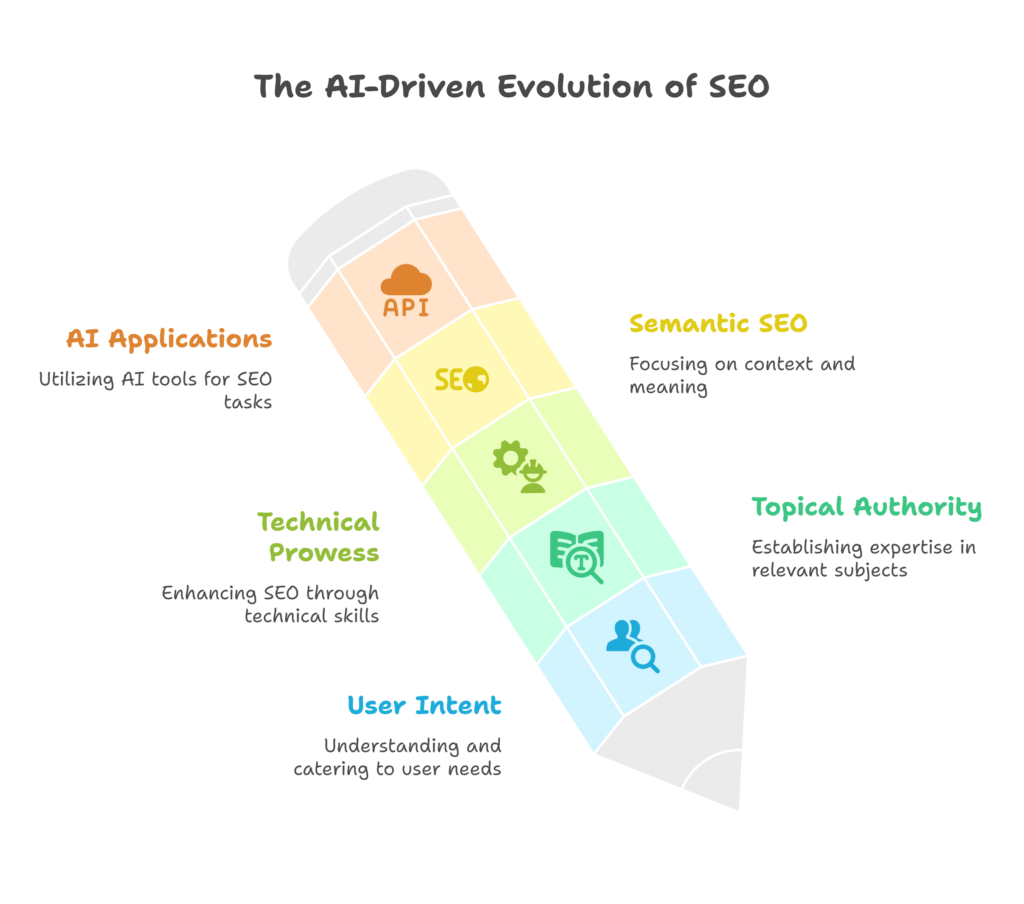
This blog post will delve into the profound impact of AI on SEO, exploring current trends and future predictions. We will analyze the fundamental principles of semantic SEO and how AI applications are enhancing these strategies. Furthermore, we will provide actionable insights and best practices for leveraging AI to build a smarter, more effective SEO strategy that not only adapts to the changing algorithms but also anticipates them. Get ready to discover how the robots are here to help you navigate the intricate world of SEO and achieve unparalleled success.
The AI Revolution in SEO: Current Trends and Impact
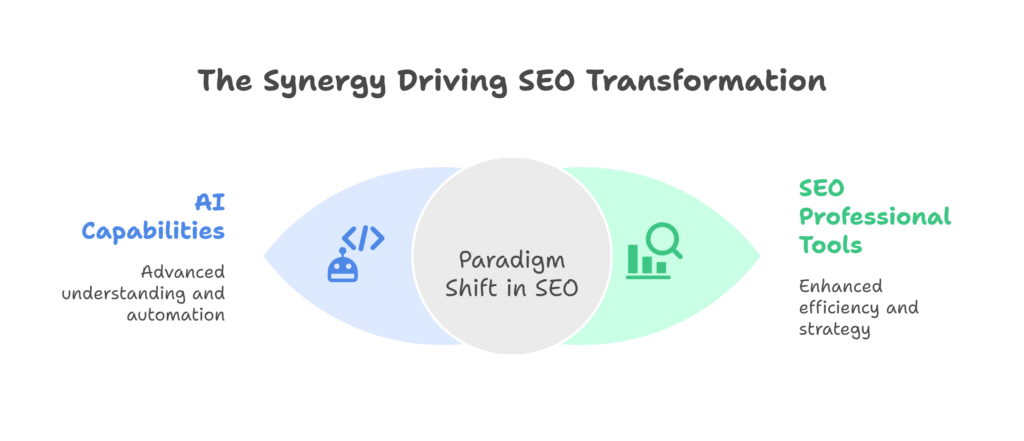
The integration of Artificial Intelligence into search engine optimization is not merely an incremental improvement; it represents a fundamental paradigm shift. AI’s capabilities are enabling search engines to understand content and user intent with unprecedented depth, while simultaneously empowering SEO professionals with tools that enhance efficiency and strategic foresight. The trends emerging from this revolution are reshaping the very fabric of how we approach digital visibility.
AI Overviews and SERP Dominance
One of the most significant manifestations of AI’s influence on search is the rise of AI Overviews, formerly known as Search Generative Experience (SGE). Google’s integration of generative AI features directly into the search engine results page (SERP) provides users with AI-generated responses at the top of their search results [1]. These summaries compile information from various sources, offering quick, digestible answers without the need for users to click through multiple websites. This shift has profound implications for traditional click-through rates (CTR).
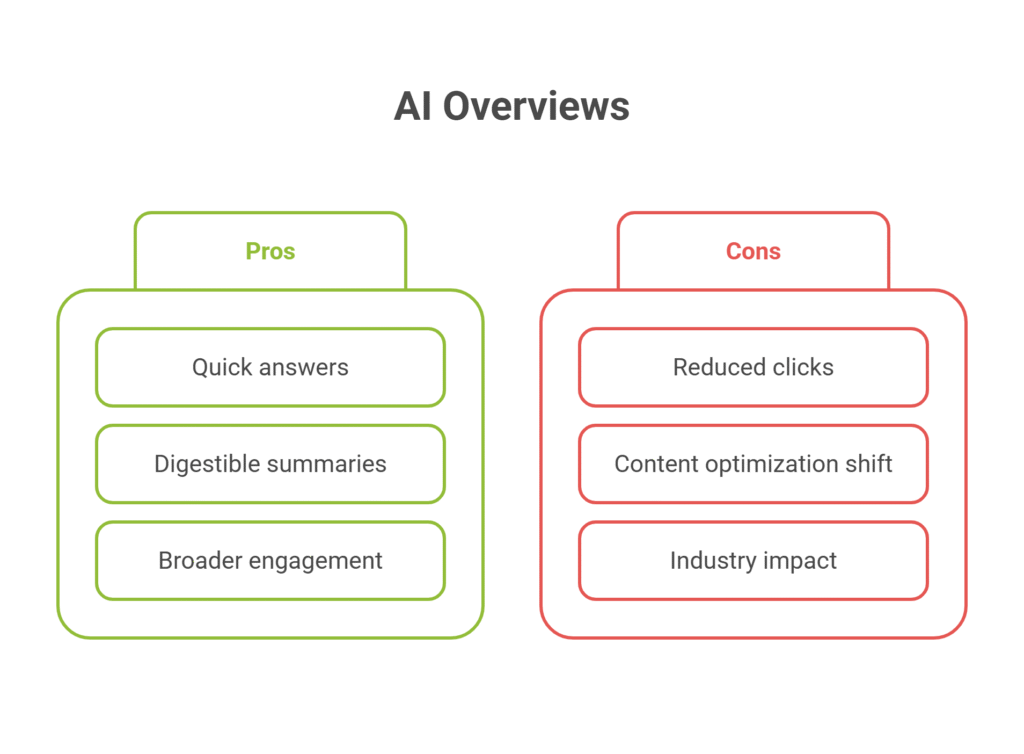
Research indicates that AI Overviews are rapidly expanding their presence on SERPs. In June of the previous year, they appeared in approximately 7% of searches, a number that surged to nearly 20% by November [4]. For informational-intent heavy industries, this figure can exceed a third of all SERPs. While concerns exist about a potential decrease in organic clicks—with some early signs suggesting an 18-64% reduction for affected queries [1]—it’s crucial to view this not as an end to SEO, but as an evolution. The focus for businesses and publishers must now shift towards optimizing content to be included in these AI-generated summaries, rather than solely aiming for traditional ‘blue link’ rankings [1]. Just as mobile search and featured snippets initially sparked apprehension but ultimately led to broader search engagement, AI Overviews are likely to become another critical factor for SEO optimization.
LLM Adoption and Market Share
Beyond Google’s direct integration of AI, the increasing adoption of Large Language Models (LLMs) like Perplexity AI, ChatGPT, and Claude AI is also significantly impacting the search landscape. These platforms are emerging as viable alternatives to traditional search engines, with Google’s market share dropping below 90% for the first time since March 2015 in October 2024 [1]. The appeal of LLMs lies in several key advantages:
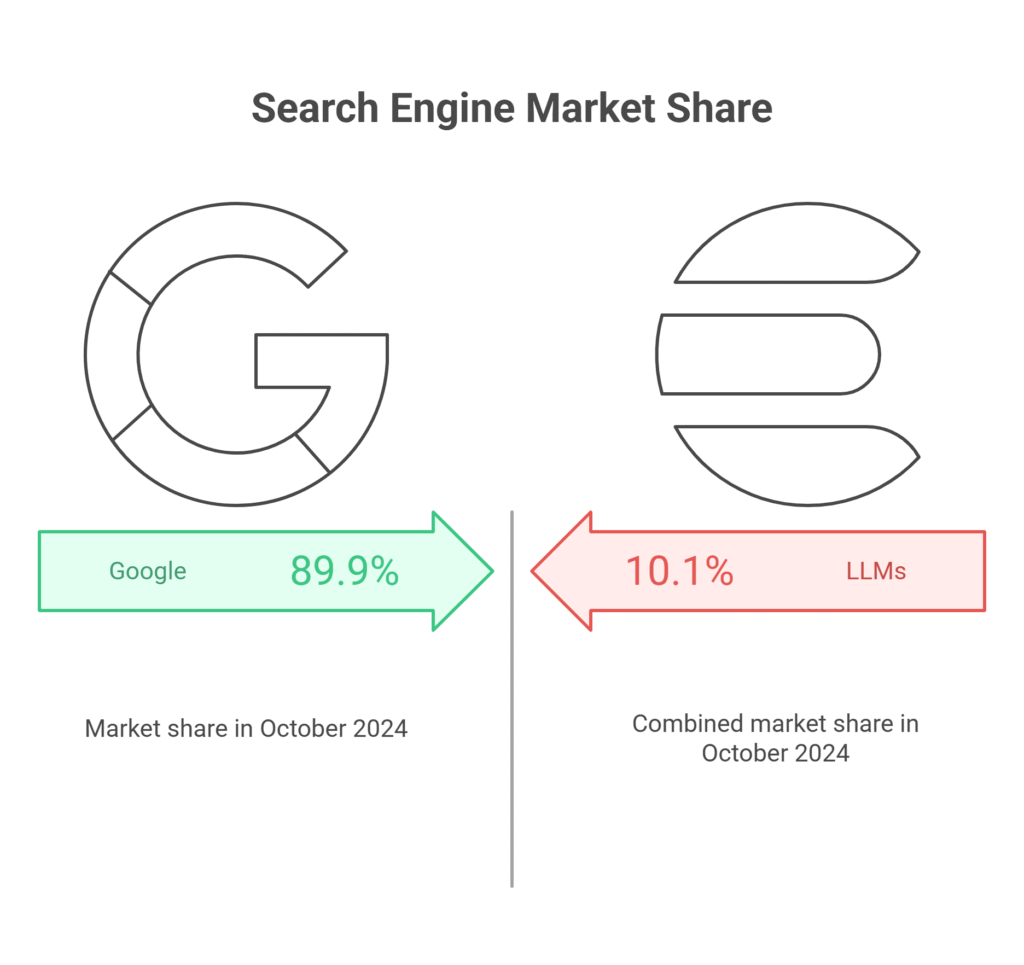
- Conversational Interactions: Users can engage with LLMs using natural language, receiving coherent and contextually relevant responses [1].
- Direct Answers: LLMs often provide immediate, synthesized answers, eliminating the need to sift through numerous web pages [1].
- Multitasking Capabilities: Many LLMs can perform a range of tasks, including writing, coding, and analysis, alongside information retrieval [1].
The rapid growth in search interest for LLMs—up by 4,850% over the past five years [1]—underscores their growing influence. This trend necessitates a new approach to
SEO, where optimization extends beyond traditional search engines to these emerging platforms.
User-Generated Content (UGC) and Community Search
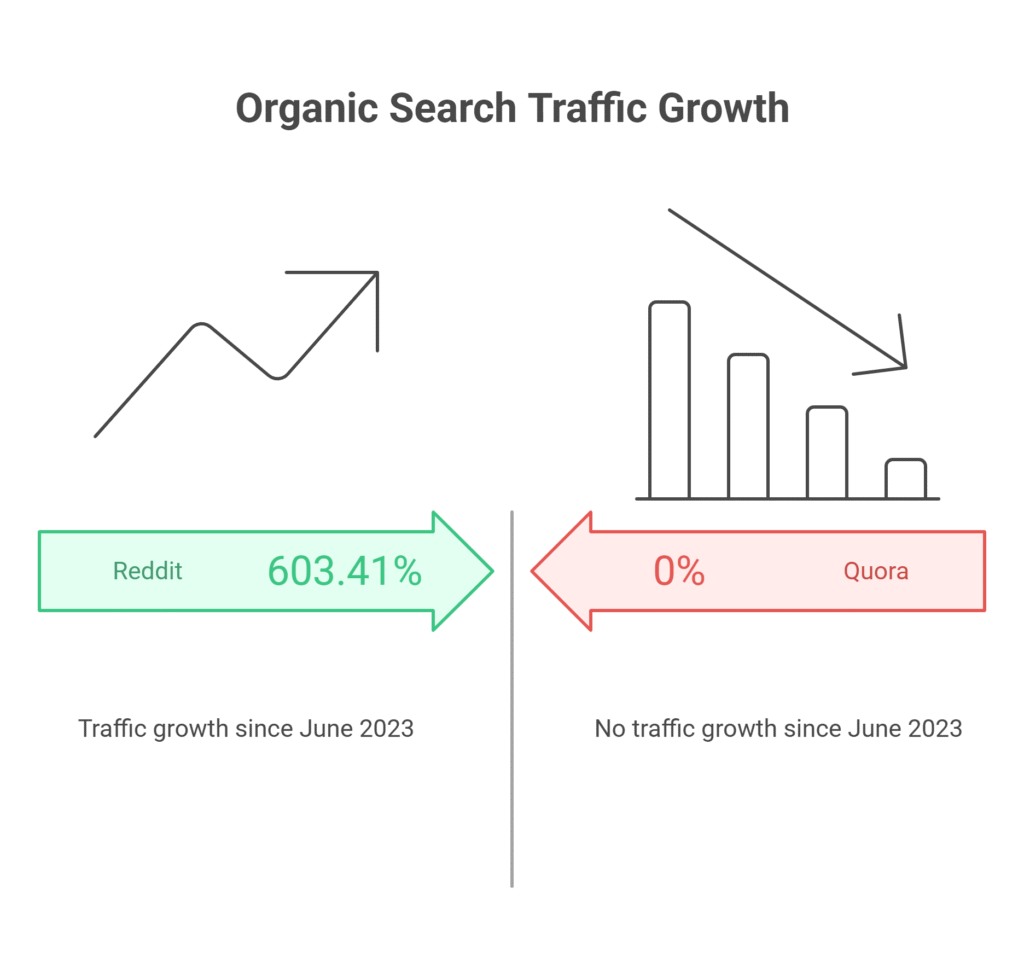
The rise of AI-generated content has, paradoxically, amplified the value of human-generated content. Platforms like Reddit and Quora are experiencing a surge in organic search traffic, with Reddit’s traffic growing by a staggering 603.41% since June 2023 [1]. This trend is driven by a growing user preference for authentic, real-life insights and recommendations, which are often found in community-driven forums. Google’s algorithms are increasingly rewarding this type of content, recognizing its ability to satisfy user intent with genuine, experience-based information. For businesses, this presents a significant opportunity to leverage UGC for SEO. Engaging with communities where customers are active, and even building a brand presence on these platforms, can drive substantial organic traffic. The projected growth of UGC to drive 80% of SEO-enhancing content by 2030 underscores the importance of integrating this strategy into a comprehensive SEO plan [1].
AI as an Efficiency Multiplier for SEO Professionals
While the prospect of AI can seem daunting, its primary role in SEO is not to replace human expertise but to augment it. AI is a powerful tool for automating and enhancing various aspects of the SEO workflow. A remarkable 86% of SEO professionals are already using AI in their workflows, with 83% of companies with over 200 employees reporting improvements in SEO performance since adopting AI [1]. On average, those using AI are saving 12.5 hours per week [1].
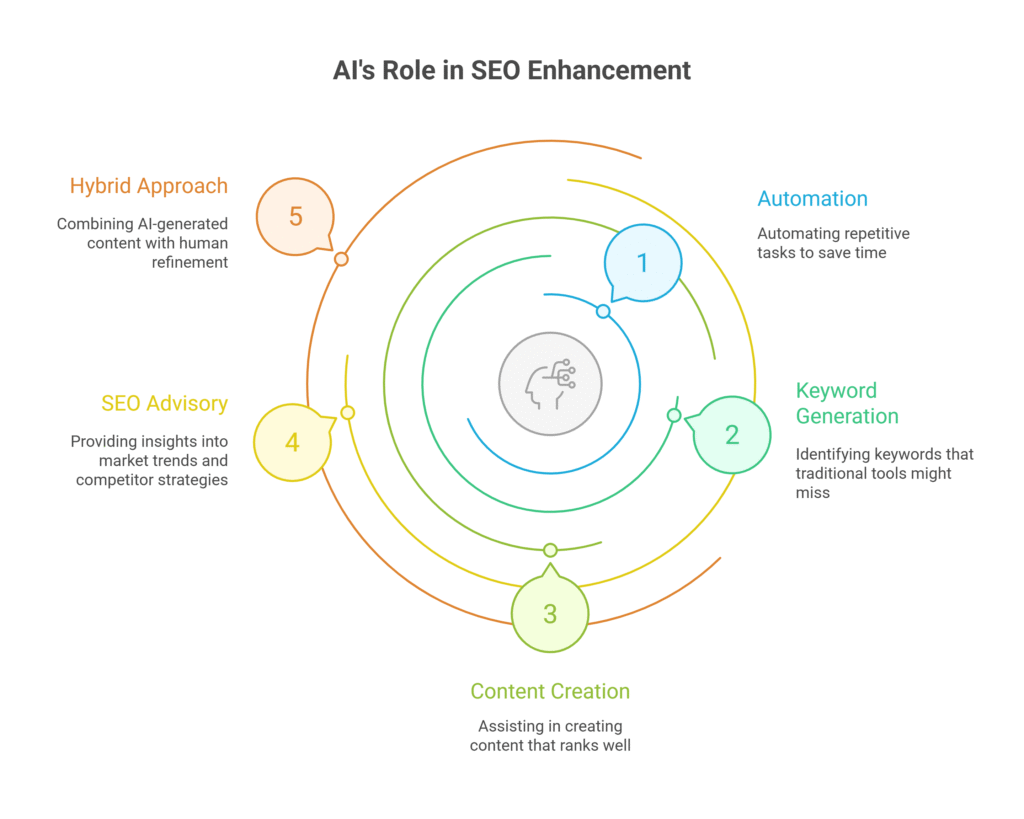
AI’s applications in SEO are vast and varied. It can automate tedious research tasks, generate keyword lists that traditional tools might miss, and even assist in content creation. AI-powered tools can also function as SEO advisors, providing in-depth insights into market trends, competitor strategies, and audience behavior. While AI-generated content can perform almost identically to human-written content in terms of ranking, the most effective approach is often a hybrid one, where AI-assisted content is refined and edited by human experts. This synergy allows SEO professionals to work more efficiently, focusing on higher-level strategic tasks while leveraging AI for automation and data analysis.
E-E-A-T and Brand Signals
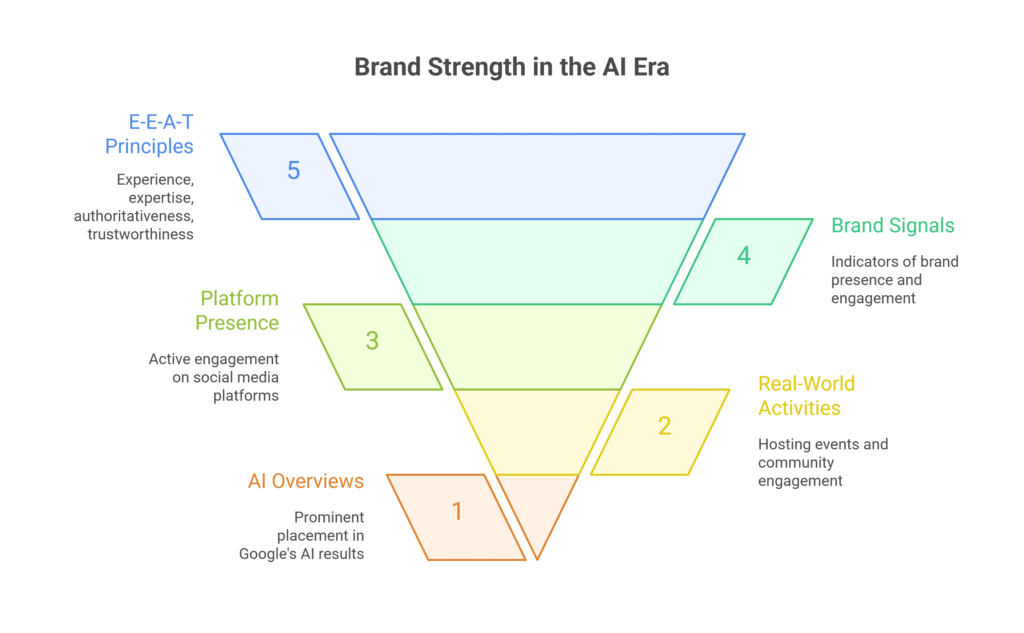
In the age of AI, the principles of E-E-A-T (Experience, Expertise, Authoritativeness, and Trustworthiness) and strong brand signals have become more critical than ever. As search engines and AI models become more sophisticated, they rely on these signals to differentiate trusted sources from the vast sea of online content. Google’s updates have increasingly impacted sites with high organic traffic but little to no brand traffic, indicating a clear preference for established brands [1]. Building a strong brand presence across multiple platforms, such as YouTube, Facebook, and Instagram, and engaging in real-world activities like hosting events, can significantly enhance a website’s ranking potential. This is particularly important for securing a coveted spot in AI Overviews, where Google rewards real brands with source links and prominent placement. In essence, a strong brand acts as a layer of defense, ensuring that a website’s content is recognized as a quality result in the increasingly crowded digital landscape.
Semantic SEO: Understanding Context and Intent
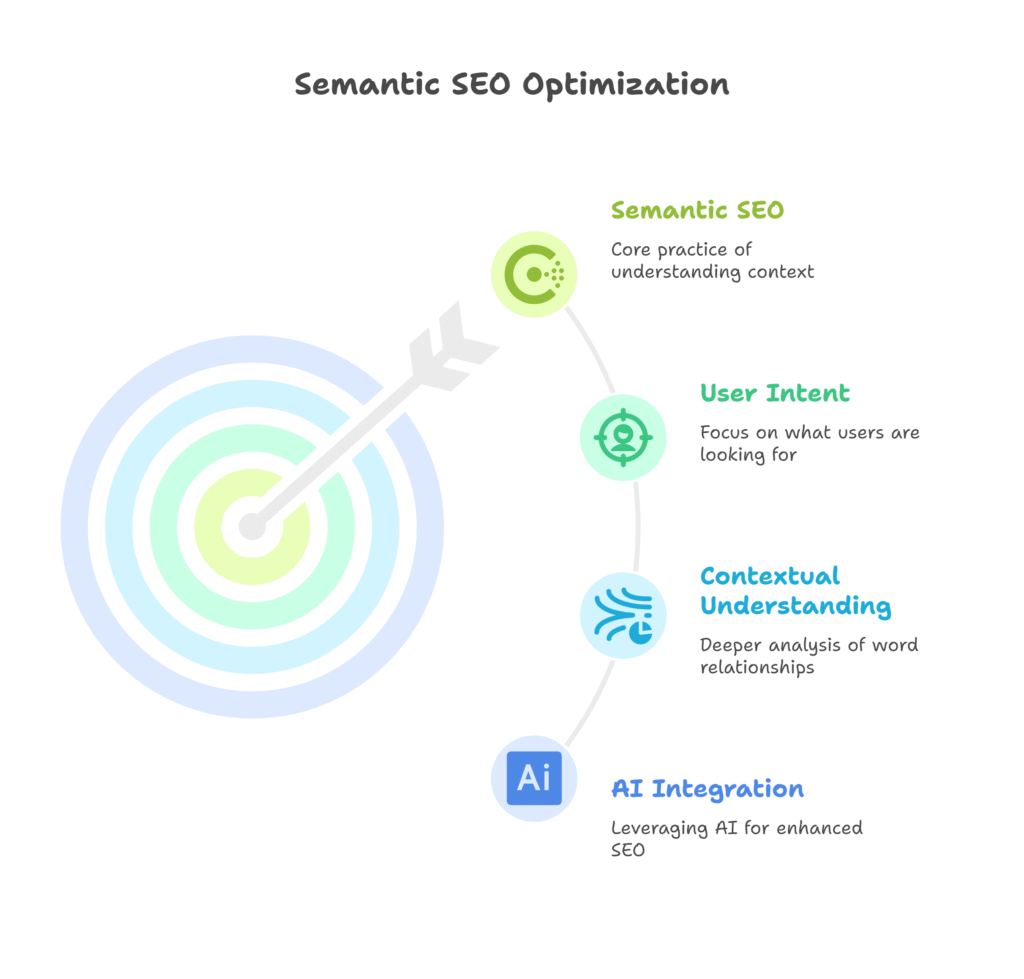
Semantic SEO is the practice of creating content that is optimized for topics and user intent, rather than just individual keywords. It involves a deeper understanding of the context and relationships between words, allowing search engines to deliver more relevant and valuable content to users. This approach has become increasingly important in the age of AI, as search engines become more adept at understanding the nuances of human language.
What is Semantic SEO?
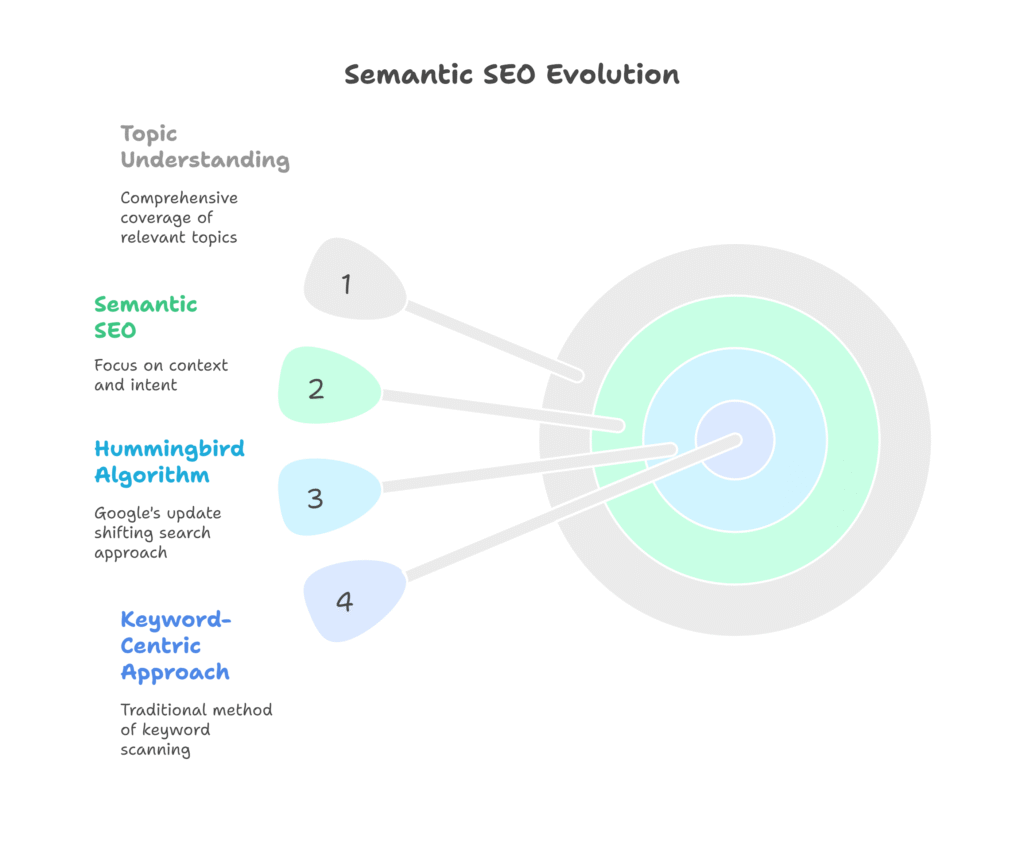
The concept of semantic SEO can be traced back to Google’s Hummingbird algorithm update in 2013. This update marked a significant shift in how Google processed search queries, moving from a keyword-centric approach to a more topic-focused one. Instead of simply scanning pages for keywords, Google began to understand the overall topic of a page, much like a human would. This means that a page can rank for a particular query even if it doesn’t contain the exact keyword phrase, as long as it comprehensively covers the relevant topic.
Why Semantic SEO Matters in the AI Era
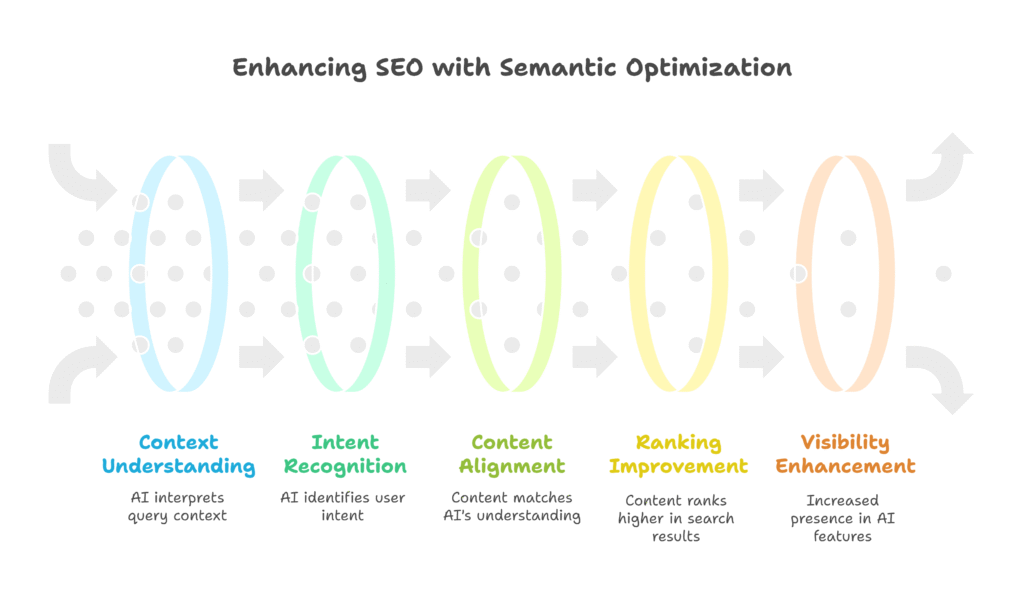
In the current AI-driven landscape, semantic SEO is more critical than ever. AI-powered search engines and answer engines are designed to understand the context and intent behind a user’s query. By optimizing for semantic SEO, you are essentially aligning your content with how these intelligent systems process information. This not only improves your chances of ranking in traditional search results but also increases your visibility in AI-powered features like AI Overviews and answer engine responses.
Best Practices for Semantic SEO
To effectively implement a semantic SEO strategy, consider the following best practices:
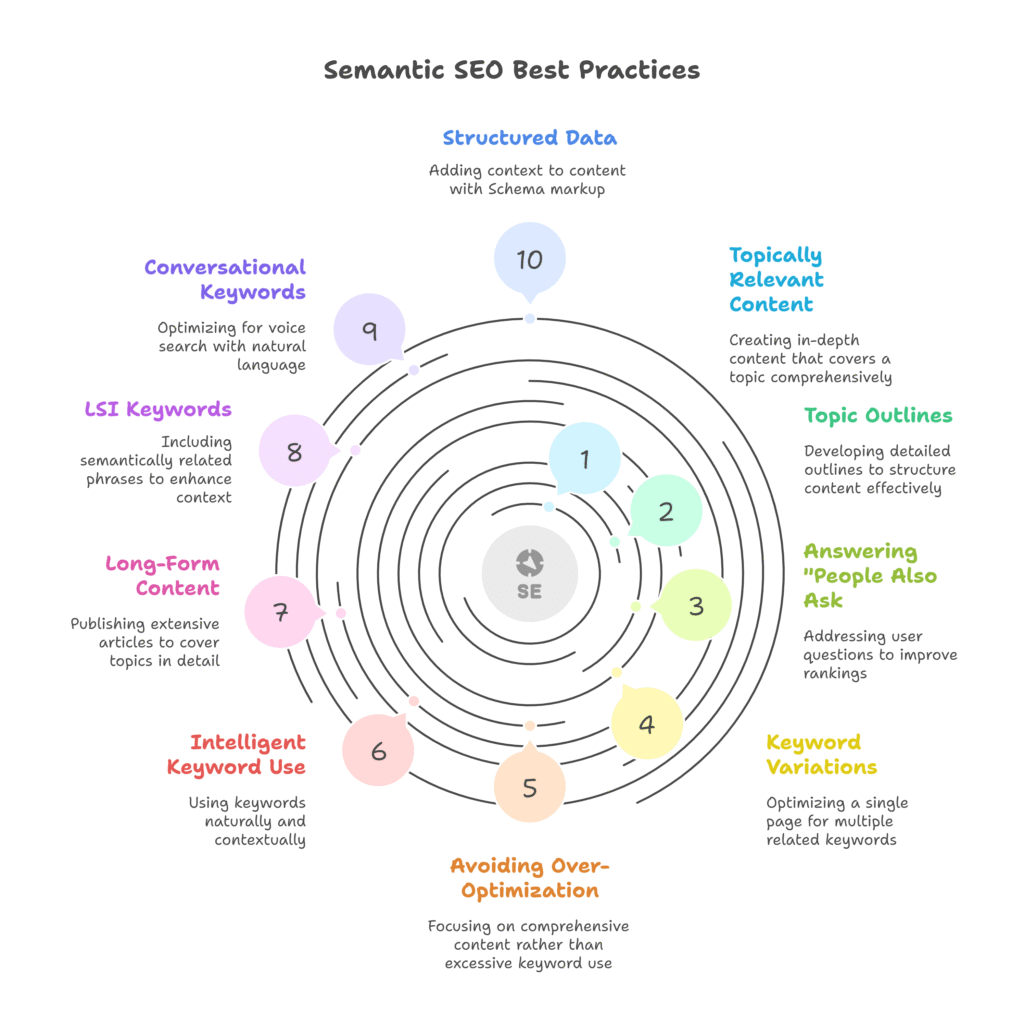
- Publish Topically Relevant Content: Create in-depth content that covers a topic comprehensively. Instead of writing a short, superficial blog post, aim to create a definitive guide that answers all of a user’s potential questions on a given topic.
- Create Topic Outlines: Before you start writing, create a detailed outline that lists all the subtopics you plan to cover. This will help you create a well-structured and comprehensive piece of content.
- Answer “People Also Ask” Questions: Google’s “People Also Ask” boxes provide valuable insights into the questions users are asking about a particular topic. By answering these questions in your content, you can improve your rankings and even get featured in these boxes.
- Target Keyword Variations with the Same Page: Instead of creating separate pages for every keyword variation, optimize a single page for multiple related keywords. Google’s semantic understanding allows it to rank a single page for various related queries.
- Avoid Over-Optimization for Long-Tail Keywords: While long-tail keywords can be valuable, it’s no longer necessary to create separate pages for every long-tail variation. Instead, focus on creating comprehensive content that naturally incorporates these terms.
- Don’t Ignore Keywords, But Use Them Intelligently: Keywords are still important, but they should be used in a natural and contextually relevant way. The goal is to create content that is both user-friendly and search engine-friendly.
- Publish Long, Comprehensive Content: To cover a topic in-depth, you will likely need to create long-form content. Don’t be afraid to write articles that are several thousand words long, as long as the content is valuable and engaging.
- Include Semantically Related Phrases (LSI Keywords): Latent Semantic Indexing (LSI) keywords are terms and phrases that are semantically related to your main topic. Including these in your content can help search engines better understand its context.
- Optimize for Conversational Keywords (Voice Search): With the rise of voice search, it’s important to optimize your content for conversational keywords. This means using natural language and answering questions in a clear and concise way.
- Use Structured Data (Schema): Structured data, or Schema markup, adds a layer of context to your content, helping search engines understand it better. This can also lead to rich snippets in the search results, which can improve your click-through rate.
AI Applications for Enhanced Semantic SEO
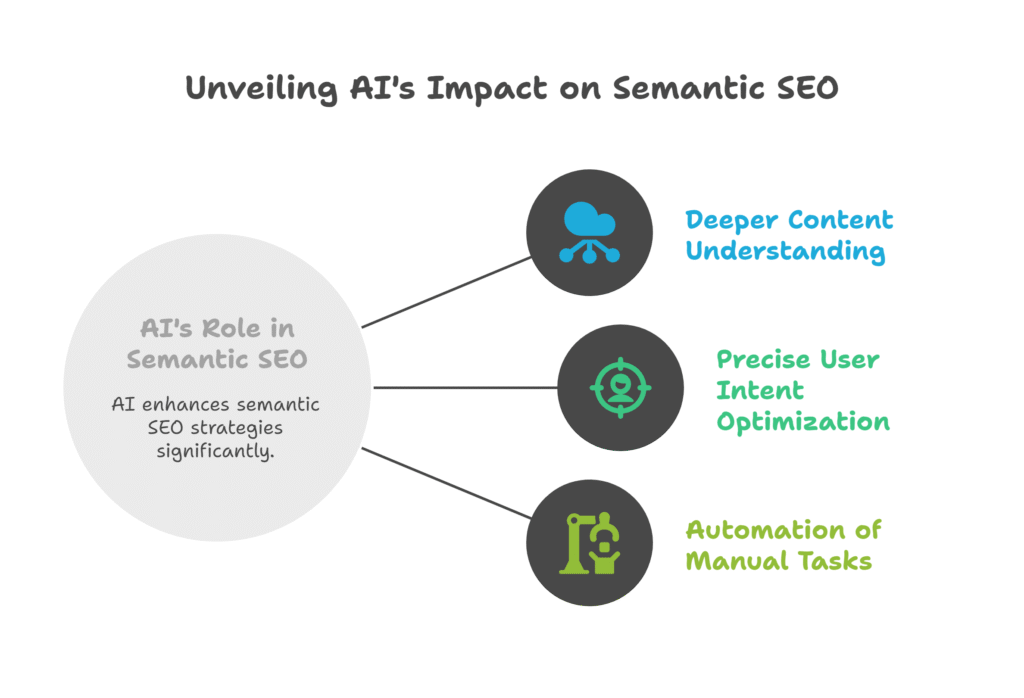
Artificial intelligence is not just changing the SEO landscape; it is actively providing tools and methodologies that significantly enhance semantic SEO strategies. By leveraging AI, marketers can achieve a deeper understanding of content, optimize for user intent with greater precision, and automate tasks that were once manual and time-consuming.
Natural Language Processing (NLP) and Missing Keyword Metrics
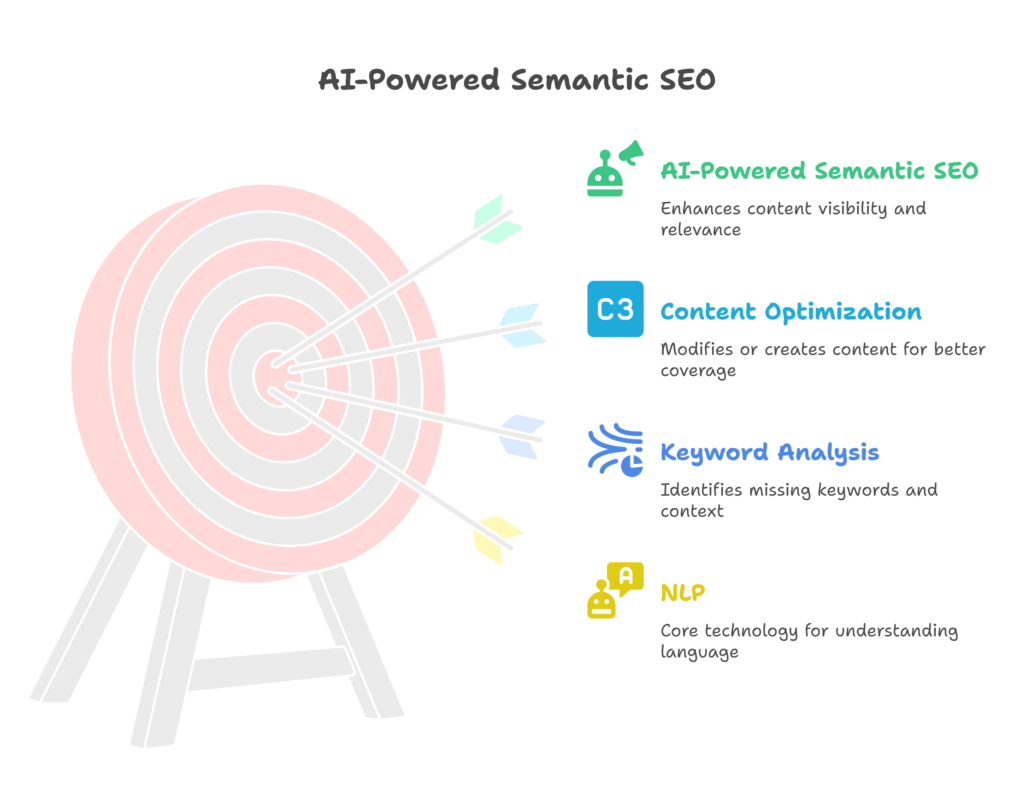
At the heart of AI-powered semantic SEO is Natural Language Processing (NLP). NLP enables AI systems to understand, interpret, and generate human language. In the context of semantic SEO, AI uses NLP to analyze vast amounts of top-performing content, identifying patterns, themes, and, crucially, missing keyword metrics. By understanding the frequency and context of keywords and related concepts within high-ranking pages, AI can pinpoint content gaps in your own material. This allows for the creation of more relevant and comprehensive content that aligns with search engine expectations for better visibility. Furthermore, advanced AI tools can even suggest how to integrate these missing keywords, either by modifying existing paragraphs or by generating entirely new sections, ensuring optimal semantic coverage.
Semantic Clusters and Automated Internal Linking
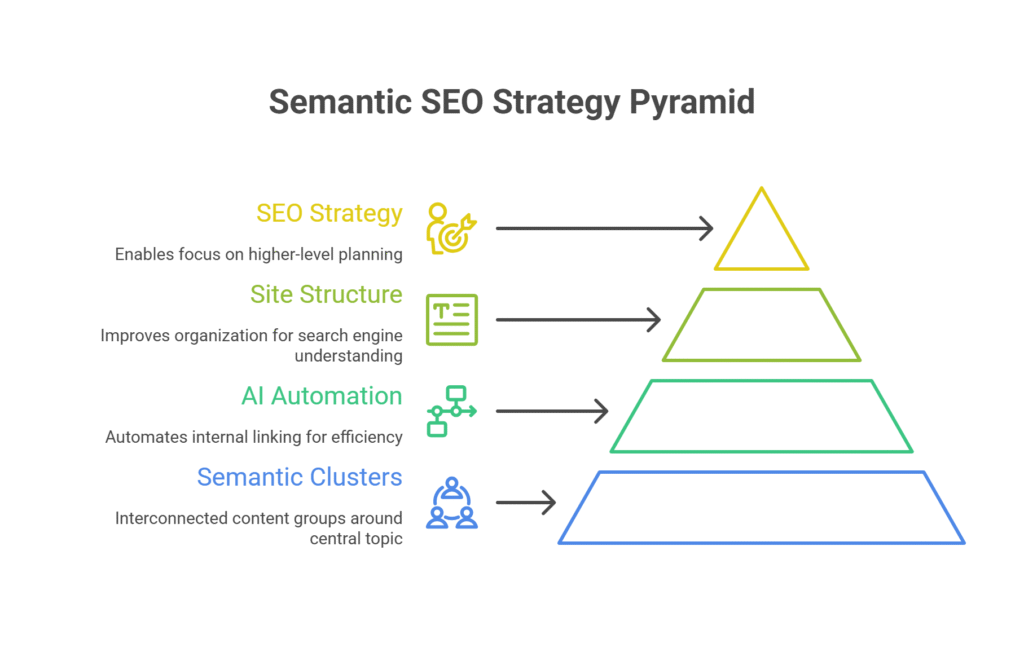
Building strong semantic clusters—groups of interconnected content pieces revolving around a central topic—is a cornerstone of effective semantic SEO. AI significantly streamlines this process by automating internal linking. By analyzing the relationships between different articles and pages on your website, AI can suggest relevant internal links. This not only strengthens the semantic connections between your content but also improves overall site structure, making it easier for search engines to understand the topical authority of your website. The automation of internal linking reduces the manual effort required to maintain a well-organized and semantically rich website, freeing up SEO professionals to focus on higher-level strategy.
AI-Powered “People Also Ask” Integration
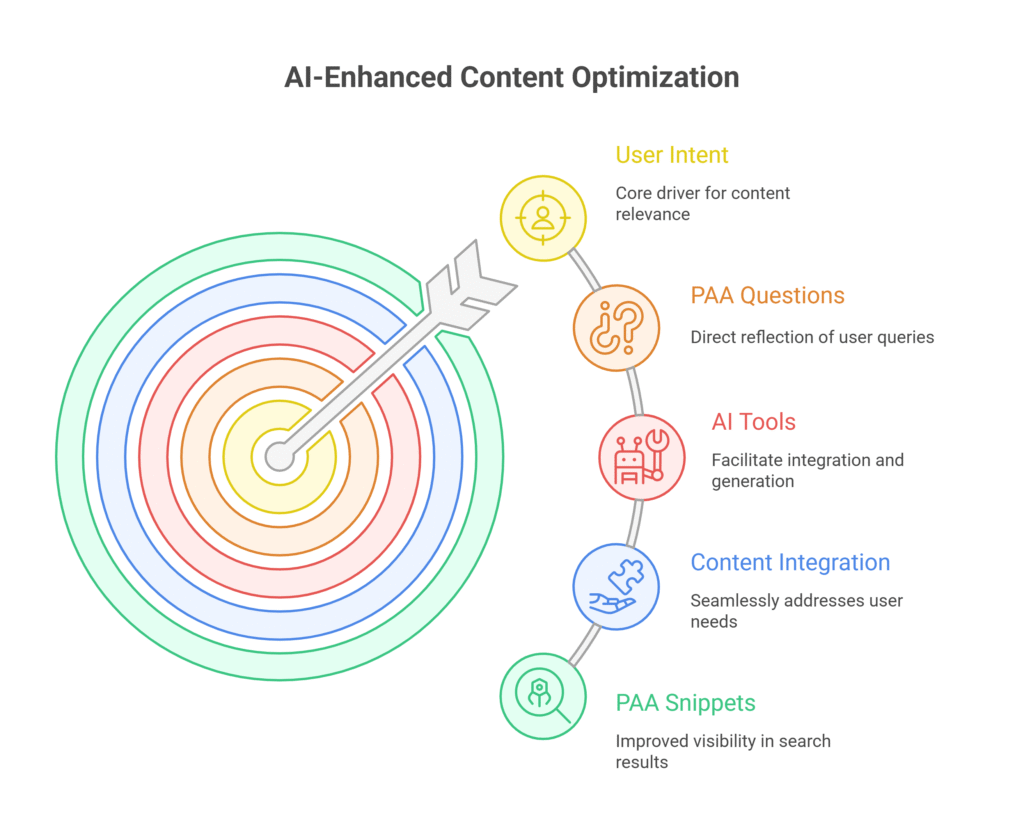
Google’s “People Also Ask” (PAA) boxes are a direct reflection of user intent and related queries. AI tools can leverage this by identifying and integrating these PAA questions, as well as other naturally related queries, directly into your content. This ensures that your content addresses a broader range of user needs and questions, further enhancing its semantic optimization. Some AI platforms even offer one-click integration of these questions and their answers, or the ability to generate entire FAQ sections based on new or existing content, ensuring comprehensive coverage of a topic and improving the chances of appearing in PAA snippets.
Conclusion
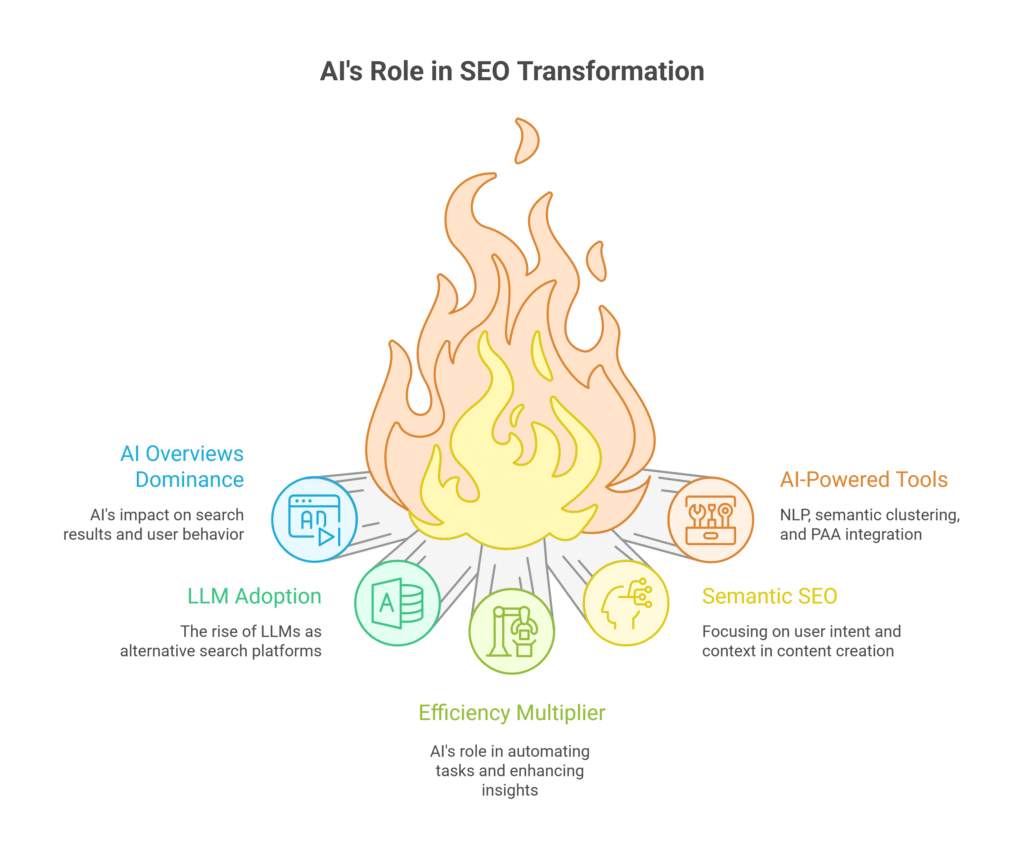
The integration of Artificial Intelligence into SEO is not a fleeting trend but a fundamental transformation that is redefining how businesses approach digital visibility. From the dominance of AI Overviews in search results to the rise of LLMs as alternative search frontiers, AI is reshaping user behavior and search engine algorithms. Simultaneously, AI is empowering SEO professionals, acting as an efficiency multiplier that automates tasks, provides deeper insights, and augments human capabilities.
At the heart of a smarter AI-driven SEO strategy lies semantic SEO. By focusing on topics and user intent rather than just keywords, and by leveraging AI-powered tools for NLP, semantic clustering, and PAA integration, businesses can create content that resonates with both search engines and users. The future of SEO is a synergistic blend of AI and human expertise, where technology enhances our ability to understand, optimize, and adapt to an ever-evolving digital landscape.
Embracing AI is no longer optional for a successful SEO strategy; it is imperative. By strategically integrating AI tools and principles, businesses can not only navigate the complexities of modern SEO but also unlock new opportunities for growth, visibility, and engagement. The robots are indeed here to help, and by harnessing their power, you can build a smarter, more effective SEO strategy that stands the test of time.
References
[1] Exploding Topics. (2025, July 2). Future of SEO: 5 Key SEO Trends (2025 & 2026). https://explodingtopics.com/blog/future-of-seo[2] Salesforce. (2025). AI for SEO: Your Guide for 2025. https://www.salesforce.com/marketing/ai/seo-guide/
[3] Conductor. (2025, May 14). 2025 AI Search Trends: The Future of SEO & Content Marketing. https://www.conductor.com/academy/seo-content-predictions/
[4] WordStream. (2025, June 25). The 8 SEO Trends That Will Shape Search in 2025. https://www.wordstream.com/blog/seo-trends-2025
[5] Backlinko. (2025, April 14). Semantic SEO: What It Is and Why It Matters. https://backlinko.com/hub/seo/semantic-seo
[6] SEO.ai. (2024, November 7). Semantic SEO: 5 Advanced Techniques (+ an AI tool). https://seo.ai/blog/semantic-seo

